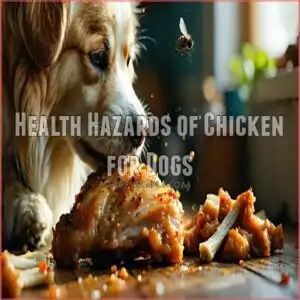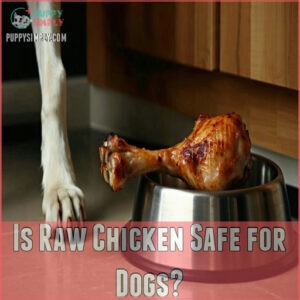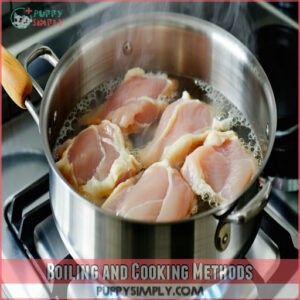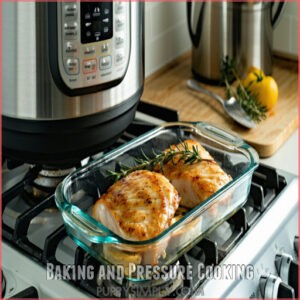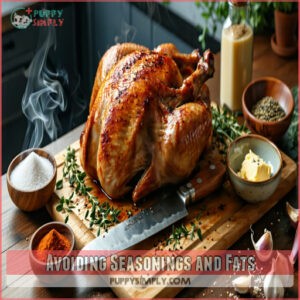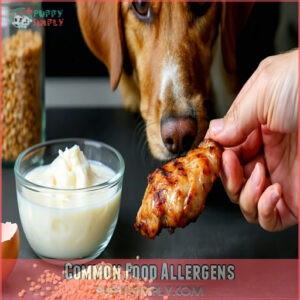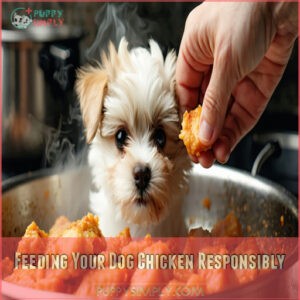This site is supported by our readers. We may earn a commission, at no cost to you, if you purchase through links.
 Yes, dogs can eat chicken! It’s a healthy protein choice when prepared properly.
Yes, dogs can eat chicken! It’s a healthy protein choice when prepared properly.
You’ll want to serve it cooked, without bones or seasonings, and limit portions to about 1/4 cup per 20 pounds of your dog’s weight.
Think of chicken as your pup’s personal protein powerhouse – it’s packed with essential amino acids for strong muscles, omega fatty acids for a shiny coat, and vitamins that keep their tail wagging.
Just like you’d avoid raw chicken for food safety, the same goes for your four-legged friend. There’s actually quite a bit of science behind why chicken makes such a tail-wagging treat for your furry family member.
Table Of Contents
- Key Takeaways
- Nutritional Benefits of Chicken for Dogs
- Can Dogs Eat Chicken Safely?
- Health Hazards of Chicken for Dogs
- Is Raw Chicken Safe for Dogs?
- Preparing Chicken for Your Dog
- Chicken Allergies and Sensitivities
- Feeding Your Dog Chicken Responsibly
- Frequently Asked Questions (FAQs)
- Can dogs eat chicken every day?
- Can one eat chicken while on a diet?
- Can dogs eat chicken without problems?
- Can dogs eat raw chicken?
- What types of chicken can a dog eat?
- Can dogs eat canned chicken?
- Can I give my dog cooked chicken?
- Why can’t dogs eat chicken?
- Can my dog eat chicken every day?
- How much chicken can you feed a dog?
- Conclusion
Key Takeaways
- You can safely feed your dog cooked chicken as it’s packed with protein, amino acids, and vitamins – aim for 1/4 cup per 20 pounds of your dog’s weight.
- You’ll need to remove all bones and seasonings before serving, as cooked bones can splinter and cause internal injuries while seasonings like garlic and onion are toxic.
- You shouldn’t feed your dog raw chicken due to risks of bacterial contamination from Salmonella and Campylobacter, which can cause severe food poisoning.
- You should watch for signs of chicken allergies like itchy skin, ear infections, or digestive issues – if they occur, consult your vet about alternative protein sources.
Nutritional Benefits of Chicken for Dogs
Chicken is packed with lean protein, vitamins, and minerals that support your dog’s overall health.
It also provides essential nutrients like amino acids and omega fatty acids to keep muscles strong, joints healthy, and their coat shiny.
Vitamins and Minerals in Chicken
Chicken is packed with essential nutrients that can keep your dog healthy and thriving.
Its rich vitamin and mineral content supports key functions in your dog’s body:
- Vitamin B3 helps manage cholesterol and maintains brain health.
- Vitamin B6 aids protein metabolism and hemoglobin production.
- Phosphorus strengthens bones and promotes energy use.
- Selenium bolsters immune defenses and protects cells.
Adding chicken to dogs’ diets isn’t just tasty—it’s packed with benefits. Learn more about safe chicken preparation for your canine companion. Remember to prepare it safely to maximize its nutritional value.
Amino Acids for Muscle Repair
In terms of muscle growth and tissue repair, there’s no doubting the value of chicken for dogs.
Packed with amino acids, chicken aids protein synthesis, helping muscles rebuild after play or recovery.
Dogs benefit from whole food ingredients for ideal nutrition.
Think of it as a natural strength boost.
For dogs, the benefits of chicken extend to maintaining a nutrient balance that supports an active, healthy lifestyle.
Omega-6 and Omega-3 Fatty Acids
A well-rounded diet for your pup includes a proper Fatty Acid Balance, and chicken can help. Chicken provides essential vitamins and minerals for dogs.
The omega6 fatty acids in chicken, paired with omega3 fatty acids, offer several benefits:
- Supports healthy skin and coat
- Aids in immune response regulation
- Balances inflammation
- Boosts cellular function
Monitoring the Fatty Acid Ratio is key. Pair chicken with other Omega Rich Foods to maintain balance and promote your dog’s overall health effectively.
Joint Health Benefits
Chicken for dogs isn’t just tasty—it’s also a natural joint superhero.
Packed with glucosamine and chondroitin sulfate, it strengthens cartilage and boosts bone health. The collagen smooths out joint function while reducing inflammation.
| Check out these key nutrients: | Nutrient | Benefit | Supports | Example |
|---|---|---|---|---|
| Glucosamine | Arthritis Relief | Cartilage Health | Joint Supplements | |
| Chondroitin Sulfate | Bone Strength | Joint Mobility | Chicken for Dogs | |
| Collagen | Inflammation Reduction | Joint Function | Chicken and Rice | |
| Protein | Muscle Repair | Overall Movement | Chicken Benefits |
Can Dogs Eat Chicken Safely?
Yes, dogs can eat chicken safely, but there are a few rules to keep in mind.
Removing bones and seasonings and cooking it properly guarantees it’s a healthy treat for your pup.
Avoiding Chicken Meal and By-Products
Not all dog food ingredients are equal, so mastering chicken labels is key for your pet’s nutrition. Some dogs suffer from chicken allergy symptoms, requiring careful ingredient selection.
- Choose whole-meat chicken as the first ingredient.
- Skip chicken meal or vague byproducts that may include unwanted parts.
- Avoid feed additives or contaminants common in low-quality dog food.
Your dog deserves safe, high-quality meals!
Safe Feeding Guidelines
Can dogs eat chicken safely? Absolutely, but follow these guidelines for your pup’s well-being.
Stick to 1/4–1/3 cup of cooked chicken for every 20 pounds of body weight to maintain proper feeding limits. Choose high-quality chicken as a protein source to support nutrient balance and digestive health.
You can find safe chicken dog treats online. Opt for fresh, thoroughly cooked chicken for dogs, ensuring it’s plain and free from harmful additives.
Monitor for potential reactions like chicken allergy in dogs.
Removing Bones and Seasonings
Bone removal is essential when prepping cooked chicken for dogs. Chicken bones splinter easily, causing choking or internal injuries.
Avoid cooked chicken bones entirely—they’re dangerous. Stick to safe chicken parts like chicken breast prepared plainly.
Skip all seasonings, as garlic and onion are toxic. Opt for safe cooking with plain, unseasoned meat stripping.
Keep chicken prep simple for your pup’s safety.
Health Hazards of Chicken for Dogs
Feeding chicken to your dog isn’t without risks, especially if it’s raw or improperly prepared.
Bacteria, bones, or even allergies can cause serious health issues, so it’s important to know what to watch for, particularly serious health issues.
Raw Chicken Risks
Raw chicken might seem natural, but it’s full of hidden dangers. Bacterial contamination like Salmonella risk makes raw meat dangerous for your dog, causing food poisoning and bacterial infections.
Cooking chicken thoroughly removes these risks and keeps your pup safe.
- Raw meat dangers include harmful bacteria that cause foodborne illnesses.
- Uncooked chicken poses serious nutritional risks.
- Always prioritize chicken safety by cooking it before serving.
Salmonella and Campylobacter Infections
Feeding raw chicken comes with bacterial risks like salmonella and Campylobacter spp, causing food poisoning, poor gut health, and serious bacterial infections.
Symptoms include diarrhea, vomiting, fever, and dehydration. Quick action is essential—don’t wait if you spot these.
Prioritize infection control and disease prevention by always cooking chicken thoroughly. Raw chicken holds dangers you can easily avoid with proper preparation and care.
Malnutrition and Imbalances
Beyond the risks of bacterial infections, serving only chicken can lead to serious nutrient deficits in your dog’s diet.
While chicken provides protein, it lacks essential vitamins and minerals your pup needs.
A balanced canine diet includes various nutrients.
Without proper supplements and variety, you’re risking dietary imbalances that could affect their health.
Think of it like eating only one food group – it’s not sustainable.
Your best bet is to work with your vet to create a balanced meal plan that meets all your dog’s nutritional needs, ensuring a healthy diet and overall well-being with the right nutritional needs.
Choking and Blockage Risks
Why would seemingly harmless chicken bones pose such a threat to your dog? When cooked, these bones can splinter into sharp fragments, creating serious choking risks and potential blockage dangers.
These bone shards may puncture your dog’s gastrointestinal tract or cause painful intestinal damage.
Remove all bones before serving chicken to your pup – it’s a simple step that could prevent an emergency vet visit, saving you from a potential emergency vet visit due to serious complications.
Is Raw Chicken Safe for Dogs?
You might’ve heard that raw chicken is good for your dog, but feeding it comes with serious health risks from harmful bacteria like salmonella.
The FDA and veterinarians don’t recommend raw chicken for dogs since it can make them sick and cause dangerous internal injuries from bones.
Bacterial Contamination Risks
Inside that tempting piece of raw chicken lurks an invisible army of bacteria waiting to make your dog sick.
Research shows dangerous pathogens like Salmonella and E. coli thrive in uncooked meat, leading to severe foodborne illness.
- Salmonella infections can cause fever, vomiting, and bloody diarrhea
- E. coli bacteria may trigger kidney failure in severe cases
- Listeria contamination risks increase at room temperature
- Cross-contamination spreads bacteria to food bowls and surfaces
Always cook chicken thoroughly to 165°F to destroy harmful bacteria and keep your pup safe from food poisoning.
Malnutrition and Deficiencies
While raw chicken provides protein, relying on it alone can lead to serious nutrient imbalances in your dog’s diet.
You’ll need to watch for signs of vitamin shortages and mineral deficiencies, which can affect your pup’s health over time.
Without proper planning, your dog might miss out on essential nutrients that balanced commercial foods provide.
Consider mixing chicken with other protein sources and supplements to guarantee complete nutrition.
Veterinary Recommendations
Veterinarians have clear guidelines for feeding chicken to your furry friend. Your vet can help create a customized meal plan that keeps your dog healthy and happy.
Here are their top recommendations:
- Cook chicken thoroughly to 165°F to eliminate harmful bacteria
- Start with small portions to watch for allergic reactions
- Consider your dog’s size, age, and health when determining portions
Always consult your vet before making major diet changes to keep your dog healthy and happy.
Alternative Protein Sources
Looking beyond chicken opens up a world of healthy protein options for your pup. If your dog needs a change from chicken due to allergies or preferences, consider these nutritious alternatives:
- Farm-fresh lamb meal offers rich protein and easy digestion
- You can find various dog food lamb products online.
- Wild-caught fish with beneficial fish oil omega-3s
- Lean venison for novel protein variety
- Duck meat as a flavorful alternative
Beef protein rounds out these wholesome choices that keep tails wagging.
Remember to introduce new proteins gradually, ensuring a smooth transition to these nutritious alternatives and maintaining your dog’s overall health with various dog food options.
Preparing Chicken for Your Dog
You’ll want to prepare your dog’s chicken correctly to keep them safe and healthy.
Whether you’re boiling, baking, or pressure cooking the meat, you’ll need to remove all bones and skip the seasonings that could upset your pup’s stomach, to ensure they remain healthy.
Boiling and Cooking Methods
Your dog’s favorite boiled chicken dinner starts with simple, safe preparation methods. For the perfect cooked meal, bring water to a rolling boil and cook chicken until it reaches 165°F internally.
You can find products for boiling chicken for your canine companion.
Here’s a handy guide for cooking times:
| Method | Time | Temperature |
|---|---|---|
| Whole pieces | 20-30 min | 165°F |
| Cubed | 10-15 min | 165°F |
| Ground | 8-10 min | 165°F |
| Breast strips | 15-20 min | 165°F |
Skip seasonings and additives – plain steamed or boiled chicken provides the safest, most digestible protein for your pup.
Baking and Pressure Cooking
Modern kitchen appliances make cooking chicken for dogs a breeze.
Whether you’re baking chicken breast at 375°F or using a pressure cooker, both methods guarantee safe preparation.
Your pressure cooker can have cooked meals ready in 15 minutes, while baking takes about 25-30 minutes.
Always check that the internal temperature reaches 165°F for food safety.
These methods preserve nutrients and create tender, easy-to-digest protein your pup will love.
Avoiding Seasonings and Fats
When preparing chicken for your furry friend, keeping it plain maximizes safety.
Here’s what you need to avoid for safe cooking:
- Skip toxic seasonings like garlic, onion powder, and chives that can harm your pup
- Never add salt or pepper, which can upset their stomach
- Remove butter and oils that add unnecessary fats
- Avoid marinades and sauces, even if they seem healthy
Plain, unseasoned chicken helps prevent allergies and digestive issues while providing lean protein.
Adding Chicken Broth
Beyond plain chicken, homemade broth can transform your pup’s mealtime into a tail-wagging experience. When you’re making chicken broth for dogs, skip the salt, onions, and garlic – these ingredients can harm your furry friend.
Add a few tablespoons to dry kibble to enhance flavor and boost hydration. Is chicken safe for dogs in broth form? Absolutely!
Just remember to keep it simple. The liquid supplement adds nutrition and can also encourage picky eaters to finish their meals, as it also boosts their overall health.
Chicken Allergies and Sensitivities
While chicken is a healthy protein for most dogs, you’ll want to watch for signs that your pup might be allergic to it since chicken ranks among the top food allergens for dogs.
If you notice your dog scratching more than usual or having digestive issues after eating chicken, they might’ve developed a sensitivity that needs your vet’s attention to determine if they have a sensitivity.
Common Food Allergens
Ten common food allergies can affect your dog, with chicken ranking among the top three allergens alongside beef and dairy.
Your pet’s dietary needs might change over time, as dogs can develop allergies at any age.
While exploring pet nutrition, this is critical to know: wheat, eggs, and lamb also frequently trigger reactions.
Understanding these allergens helps you make informed choices about your dog’s meals.
Symptoms of Chicken Allergies
Spotting your dog’s chicken allergy starts with knowing what to watch for. Like humans, dogs show their food allergies through clear warning signs.
- Red, itchy skin patches that your pup can’t stop scratching
- Chronic ear infections that keep coming back
- Upset stomach with vomiting or diarrhea
- Excessive paw licking and chewing
- Face rubbing against furniture or carpet
Your furry friend might also develop hives or hot spots.
These food reactions typically show up within hours after eating chicken, though some allergic responses take days to appear, often resulting in an upset stomach with symptoms like vomiting or diarrhea.
Gradual Dietary Changes
Like a careful chef, introducing chicken to your dog’s diet requires patience and planning. Smart dietary shifts start with these proven steps:
- Mix a teaspoon of plain cooked chicken with regular food
- Increase the chicken portion by 10% every three days
- Watch for signs of acceptance or rejection for 2-3 weeks
- Keep a daily log of your dog’s response to the new food
If your dog experiences adverse reactions, consider exploring chicken allergy dog food. Start with tiny portions during food rotation, about 1-2 teaspoons mixed with their usual meal.
Monitor your pup for any unusual reactions like scratching, digestive issues, or changes in energy. This measured approach helps guarantee a smooth adaptation to a balanced diet.
Feeding Your Dog Chicken Responsibly
You’ll need to be smart about feeding chicken to your dog since it should only make up about 10% of their daily calories.
While chicken is a healthy protein choice, you’ll want to balance it with other foods and check with your vet about the right portion size for your pup.
Caloric Intake and Portion Control
Starting with your dog’s daily caloric needs helps determine proper chicken portions. A medium-sized dog (44 pounds) typically needs 50-60 grams of cooked chicken per day, excluding treats.
Your pup’s exact needs depend on age, activity level, and weight goals.
Track portions carefully – those extra table scraps add up fast!
Ask your vet to help calculate the perfect amount for your dog to ensure a balanced diet.
Balancing Protein and Nutrients
While managing portions keeps your dog healthy, balancing proteins and nutrients takes their diet to the next level. A well-rounded meal plan isn’t just about adding chicken – it’s about smart combinations that fuel your pup’s health.
- Mix chicken with other proteins like fish or beef for complete amino acid profiles
- Add healthy fats from salmon or eggs to support coat health
- Include fiber-rich vegetables to aid digestion
- Balance calcium and phosphorus with appropriate supplements
Think of protein balance like building blocks – each piece plays its part in your dog’s nutrition puzzle. This approach ensures your dog receives a complete and balanced diet.
Consulting a Veterinarian
Before feeding chicken to your dog, schedule a chat with your veterinarian for personalized advice.
They’ll assess your pup’s health needs, check for allergies, and create a customized nutrition plan. Think of them as your pet’s dietary coach – they’ll guide you on portion sizes, cooking methods, and how chicken fits into a balanced diet.
Their expertise keeps your furry friend healthy and happy.
Vet Visit Focus Why It Matters
Avoiding Nutritional Deficiencies
While your vet guides your dog’s diet plan, keeping a balanced diet prevents gaps in their nutrition. Chicken alone won’t meet all your pup’s nutrient needs.
Follow these key steps for complete canine nutrition:
- Mix chicken with other protein sources like fish or lean beef
- Add vegetables and whole grains for fiber and vitamins
- Include supplements recommended by your canine nutrition specialist
Remember, dietary variety isn’t just good sense – it’s the foundation of healthy digestion.
Frequently Asked Questions (FAQs)
Can dogs eat chicken every day?
You can feed your dog chicken daily as part of a balanced diet.
It’s best to limit chicken to 10% of their daily calories and mix it with other protein sources, grains, and vegetables.
Can one eat chicken while on a diet?
Who doesn’t love a juicy chicken breast?
You’ll be glad to know chicken is perfect for dieting.
It’s low in calories, high in protein, and you can prepare it in many healthy ways.
Can dogs eat chicken without problems?
Your dog can safely eat cooked, plain chicken as part of a balanced diet.
You’ll want to remove bones and skin first.
Keep portions moderate and watch for allergic reactions in your pup.
Can dogs eat raw chicken?
Raw chicken isn’t safe for your pup due to harmful bacteria like salmonella. You’ll want to thoroughly cook any chicken you’re serving to avoid health risks and potential bone splinters.
What types of chicken can a dog eat?
You can safely give your pup cooked chicken breast, thighs, or organs like liver and heart.
Skip seasonings and remove bones.
Boiled, baked, or grilled preparations work great as part of a balanced diet.
Can dogs eat canned chicken?
While canned chicken isn’t ideal, you can feed it to your dog occasionally.
Just pick low-sodium varieties without added seasonings.
It’s best to rinse the chicken first to remove excess salt and preservatives.
Can I give my dog cooked chicken?
Yes, you can give your dog cooked chicken that’s plain and boneless.
It’s a healthy protein source when prepared without seasonings or oils.
Just remember to remove all bones, as they’re dangerous for dogs.
Why can’t dogs eat chicken?
Like a careful parent, you’ll want to know that dogs can actually eat chicken safely.
It’s a myth they can’t – they just need it cooked properly, without bones or seasoning.
Watch for allergies though!
Can my dog eat chicken every day?
Your dog can eat chicken daily as part of a balanced diet.
You’ll want to keep portions moderate – about 1/4 cup per 20 pounds of body weight.
Remove bones and avoid seasonings.
How much chicken can you feed a dog?
Feed your dog 1/4 to 1/3 cup of cooked chicken per 20 pounds of body weight.
You’ll want to mix it with other foods since chicken alone won’t provide complete nutrition for your pup.
Conclusion
Like a loyal friend, chicken can be a healthy addition to your dog’s diet when you follow proper safety guidelines.
You now know that dogs can eat chicken safely, but preparation matters.
Remember to cook it thoroughly, remove bones, skip seasonings, and serve appropriate portions.
By following these tips and watching for any allergic reactions, you’ll give your pup a protein-rich treat they’ll love.
Just remember – moderation is key when feeding your furry friend chicken or any human food.
- https://www.akc.org/expert-advice/nutrition/can-dogs-eat-chicken/
- https://www.petmd.com/dog/nutrition/can-dogs-eat-chicken
- https://www.raisedrightpets.com/blog/can-dogs-eat-cooked-chicken/
- https://www.healthline.com/nutrition/human-foods-for-dogs
- https://grassrootscoop.com/blogs/impact/can-dogs-eat-raw-chicken



